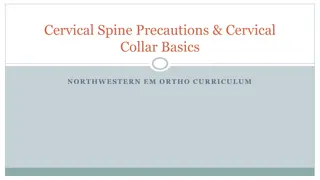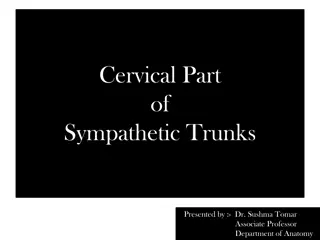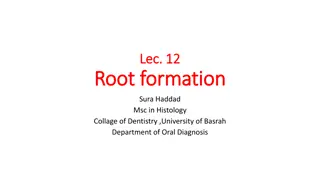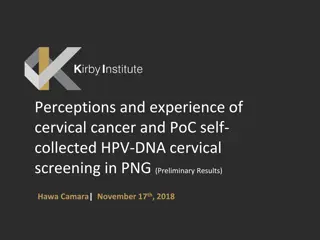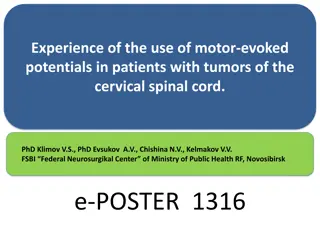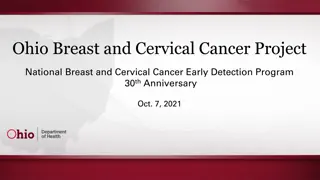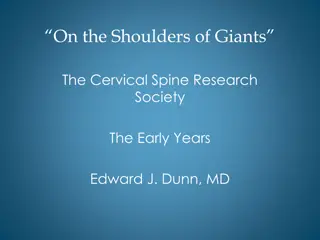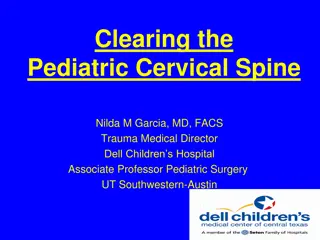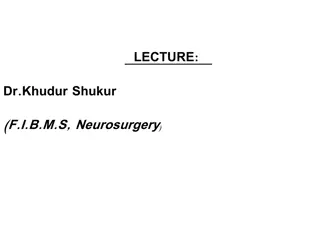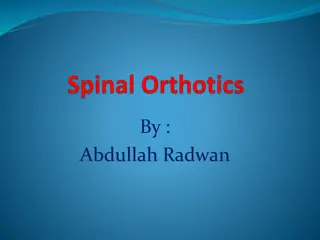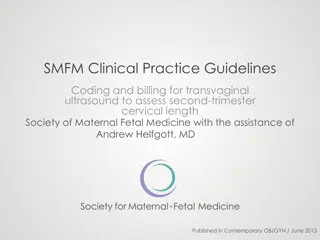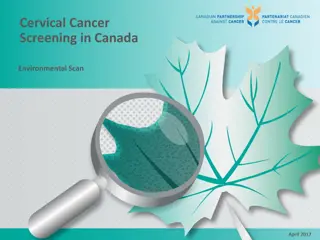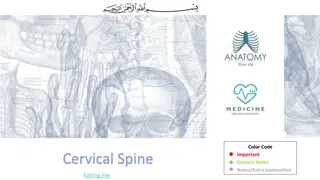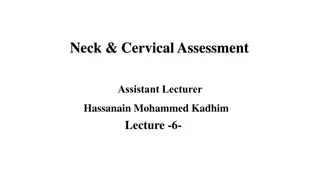Understanding Cervical Screening Test Results
Guidance provides information on understanding the results of cervical screening tests, including primary HPV screening and the significance of positive and negative test results. It also explains the reasons for repeating a sample and the management recommendations based on the test results.
18 views • 16 slides
Guidance for the training of cervical sample takers
Guidance provides information on organizing the NHS Cervical Screening Programme, including screening protocols, sample taker responsibilities, and access to national guidance.
2 views • 21 slides
What you need to know about the HPV Vaccine
Globally, cervical cancer is the fourth most common cancer in women, with 6,04,000 new cases in 2020. Women living with HIV are 6 times more likely to develop cervical cancer, compared to the general population, and an estimated 5% of all cervical cancer cases are attributable to HIV. The contributi
3 views • 7 slides
Approach to Critically Ill Patient: Primary Survey and Airway Management
This material provides a structured approach to managing critically ill patients, focusing on the primary survey steps including airway and cervical spine control. It covers assessment techniques, interventions, and guidelines for ensuring patient safety, particularly in cases of potential airway co
1 views • 38 slides
Ensuring Equality of Access to Cervical Screening: Key Considerations
Providing guidance on promoting equality of access to cervical screening, the importance of informed choice, information accompanying screening invitations, and checking for understanding to support individuals making informed decisions. Emphasizes the need for culturally sensitive approaches, espec
5 views • 21 slides
Practical Aspects of Taking Cervical Samples: Guidance for Sample Takers
This guidance covers practical aspects of taking cervical samples, including preparing the environment, essential equipment, checking patient identity, and effective communication skills for sample takers to provide information and answer questions. It emphasizes the importance of a warm, well-lit,
7 views • 49 slides
Overview of the NHS Cervical Screening Programme
The NHS Cervical Screening Programme aims to reduce the incidence and mortality of invasive cervical cancer by offering regular screening to eligible individuals. It covers the history, population screening programmes, and key milestones. Learn about the importance, coverage, and guidelines of the p
6 views • 19 slides
Guidance for the training of cervical sample takers
Efficient and accurate cervical screening sample requests are crucial for timely and appropriate patient management. Utilizing the Open Exeter system, sample takers can access pre-populated forms to streamline the process. When deviating from Open Exeter, providing a valid explanation ensures contin
7 views • 13 slides
Investigating Human Papillomavirus Genomes in Cervical Neoplasms
This project focuses on studying the Human Papillomavirus (HPV) genome's association with disease progression and treatment response in cervical neoplasms and cancer. The research aims to genotype high-risk HPVs in healthy and diseased cervix, identify prevalent genotypes, detect genotype drift, cha
1 views • 13 slides
Cervical Spondylosis: Understanding Symptoms, Evaluation, and Treatment Options
Cervical spondylosis is a degenerative condition of the spine that can lead to neck pain, limited range of motion, and other discomforts. In this case study of an 85-year-old female, the subjective and objective evaluations reveal symptoms and physical findings associated with cervical spondylosis.
1 views • 18 slides
Cervical Spine Precautions & Cervical Collar Basics
Cervical collars, also known as C-Collars, are medical devices worn around the neck to support and immobilize the cervical spine. They are commonly used after trauma or surgery. Trauma patients with blunt traumatic injuries may benefit from C-Collar placement based on clinical judgment. It is import
0 views • 11 slides
Understanding the Cervical Part of Sympathetic Trunks
The sympathetic trunks play a crucial role in the human body, with the cervical part located in front of the transverse processes of cervical vertebrae and the neck of the 1st rib. This part presents three ganglia - superior, middle, and inferior. Sometimes, the inferior cervical and first thoracic
0 views • 25 slides
Systematic Analysis of Real Samples in Analytical Chemistry
This analysis covers the systematic process involved in analyzing real samples, including sampling, sample preservation, and sample preparation. It discusses the importance of accurate sampling in obtaining information about various substances, such as solids, liquids, gases, and biological material
0 views • 54 slides
Root Development in Tooth Growth Process
Root formation plays a crucial role in the development of teeth, starting after enamel and dentin formation at the cementoenamel junction. Hertwig's epithelial root sheath (HERS) molds the shape of roots, initiating radicular dentin formation. The cervical loop forms an epithelial diaphragm, narrowi
0 views • 23 slides
Anatomy of the Prevertebral Region in the Neck
The prevertebral region in the neck extends from the 1st cervical vertebra to the upper two thoracic vertebrae. It includes structures like prevertebral and paravertebral muscles, cervical plexus, sympathetic chains, and large vessels. The prevertebral muscles, including rectus capitis anterior and
0 views • 15 slides
Spectrophotometric Determination of Cr and Mn in Steel Samples
This experiment aims to determine the concentrations of manganese and chromium in steel samples by converting Cr3+ and Mn2+ ions to light-absorbing forms, followed by spectrophotometric measurements at specific wavelengths. Steel samples are oxidized, dissolved, and further oxidized to form dichroma
0 views • 10 slides
Depth Profile Analysis of Fusion-Relevant Samples Using LIBS Technique
Analysis of fusion-relevant samples through Laser-Induced Breakdown Spectroscopy (LIBS) is conducted at Comenius University. The study compares picosecond (ps) and nanosecond (ns) regimes in depth profiling and quantification of tungsten-based coatings and other fusion materials. The research also i
0 views • 8 slides
Cervical Cancer Vaccination Program Details for Female Employees of Ciena India
Cervical Cancer Vaccination program details for female employees of Ciena India provided by MARSH Insurance Brokers (I) (P) Ltd. Learn about the eligibility criteria, appointment booking process, reimbursement steps, and FAQs regarding the vaccination program. Employees can choose the date and place
0 views • 16 slides
Role of Lymphadenectomy in Genital Malignancies
Pelvic and paraaortic lymph node evaluation is crucial in the surgical staging of gynecological malignancies. The goals of lymph node dissection are to determine disease extent and guide further treatment. Pelvic lymph nodes include common iliac, external and internal iliac, obturator, sacral, and p
0 views • 16 slides
Perceptions and Experiences of Cervical Cancer and PoC Self-Collected HPV-DNA Cervical Screening
Explore the preliminary results of a study on perceptions and experiences of cervical cancer and point-of-care self-collected HPV-DNA cervical screening. The study highlights the need for improved screening services, introduces WHO GeneXpert PoC HPV-DNA technology, and advocates for global cervical
1 views • 25 slides
Navigating Statistical Inference Challenges in Small Samples
In small samples, understanding the sampling distribution of estimators is crucial for valid inference, even when assumptions are violated. This involves careful consideration of normality assumptions, handling non-linear hypotheses, and computing standard errors for various statistics. As demonstra
0 views • 19 slides
Use of Motor-Evoked Potentials in Cervical Spinal Cord Tumor Patients
Neurophysiological intraoperative monitoring using motor-evoked potentials is crucial in evaluating spinal cord function during surgery for cervical spinal cord tumors. This study examines the relationship between neurological changes and intraoperative motor-evoked potentials in patients, aiming to
0 views • 8 slides
Addressing Missing Race Data in Pre-Invasive Cervical Cancer Study
Study discusses missing race data in pre-invasive cervical cancer cases among three states and the impact on analysis. It highlights the concept of multiple imputation to handle missing data effectively, providing insights into data mechanisms and methods to treat missing values.
0 views • 25 slides
Ohio Breast and Cervical Cancer Project: Providing Critical Services for Ohioans
The Ohio Breast and Cervical Cancer Project (BCCP) celebrates its 30th anniversary by offering crucial screening and diagnostic services for Ohio women at or below 300% of the federal poverty level. The program has seen an increase in the number of women served annually, reaching over 6,000 per year
1 views • 18 slides
Exploring the Origins and Legacy of the Cervical Spine Research Society
Delve into the early years of the Cervical Spine Research Society, established by pioneers like J. William Fielding, Edward Dunn, and other founding members in 1973. The society aims to foster the exchange of ideas and advancements in the diagnosis and treatment of cervical spine injuries globally.
1 views • 79 slides
Empowering Women in Peru Through Cervical Cancer Screening and Treatment Program
In October 2015, DB Peru launched a program in the Loreto District of Peru to provide cervical cancer screening, diagnosis, and treatment to women in the Lower Napo Valley. Partnering with local communities, the initiative aims to bridge the healthcare gap and improve living conditions. This project
0 views • 8 slides
Pediatric Cervical Spine Evaluation and Clearance - Comprehensive Review
This informative content delves into the significance, assessment, and clearance of pediatric cervical spine injuries, emphasizing the stratification by age groups and the importance of early evaluation. It highlights the need for spinal clearance in all trauma patients, discusses the immobilization
0 views • 21 slides
Understanding Injuries to the Cervical and Thoracolumbar Spine
Cervical spine injuries are common, especially in the 15-30 age group, with motor vehicle accidents, falls, and sports being major causes. Male individuals are more prone to injuries. Neurological deficits are associated with specific types of injuries, necessitating prompt imaging for spinal cord i
0 views • 20 slides
Enhancing Cervical Cancer Screening through NHS Cytology Programme
The NHS Cytology Screening Programme aims to reduce incidence and mortality from cervical cancer by offering systematic, efficient screening for pre-malignant diseases. With a history dating back to 1988, the programme targets women aged 25-64, emphasizing the importance of visualizing the cervix an
1 views • 38 slides
Comprehensive Overview of Cervical Conization and Surgical Procedure
Cervical conization is a surgical procedure that involves removing a cone-shaped portion of the cervix. The extent of excision is determined by colposcopy, and the excised specimen is tagged for proper orientation. High accuracy in evaluating CIN grading and stromal invasion can be achieved through
0 views • 43 slides
Study on the Thermal and Chemical Properties of Polymer-Cement Composites
The study investigates the resistance of polymer-cement composites to thermal stress and chemical attacks such as acidic and high CO2 environments. Results show similar color changes in control cement and polymer-cement composites after thermal stress, with the latter maintaining compressive strengt
0 views • 5 slides
Understanding Orthoses: Types, Indications, Mechanisms, and Effects
Orthoses are mechanical devices used to support, stabilize, and protect various body parts. They can be categorized into different types such as cervical, cervicothoracic, thoracolumbosacral, lumbosacral, and sacroiliac orthoses. Indications for spinal orthotics include stabilizing the spine after a
0 views • 34 slides
Analytical Toxicology: Techniques and Sample Analysis in Clinical Toxicology
Analytical toxicology involves the observation, identification, and measurement of foreign compounds in biological and other samples, such as urine, blood, stomach contents, nails, hair, and DNA. Various techniques are used to isolate and identify drugs and poisons present in these samples. This fie
0 views • 12 slides
Understanding Smear Tests for Cervical Cancer Screening
Smear tests, also known as Pap tests, are essential for early detection of cervical cancer. Learn about the procedure, screening guidelines, liquid-based cytology, ideal timing for the test, and what infections it can detect. Stay informed about the importance of regular screenings to safeguard your
0 views • 17 slides
Guidelines for Coding & Billing Transvaginal Ultrasound in Second-Trimester Cervical Length Assessment
Guidelines from the Society for Maternal Fetal Medicine provide detailed recommendations on the proper technique and billing procedures for transvaginal ultrasound assessments of cervical length in pregnant women. Training requirements, quality control measures, and screening protocols for low and h
0 views • 8 slides
Overview of Cervical Cancer Screening Programs in Canada
The Canadian Partnership Against Cancer conducts an annual environmental scan on cervical cancer screening guidelines and strategies across the country. Organized screening programs are available in most provinces, offering services to asymptomatic women at average risk. This scan provides insights
1 views • 46 slides
Understanding the Cervical Spine: Anatomy and Function Explained
Explore the anatomy of the cervical spine, focusing on the 7 vertebrae, their unique characteristics, joint structures, and movements. Learn about typical and atypical vertebrae, key features like foramen transversarium, and the importance of vertebral arch components. Dive into how the cervical reg
0 views • 17 slides
Comprehensive Guide to Neck and Cervical Assessment by Hassanain Mohammed Kadhim
Learn how to inspect the neck for appearance and movement, differentiate between normal and abnormal findings, and perform palpation techniques for the trachea, thyroid gland, and cervical lymph nodes. Discover the important landmarks and characteristics to assess during a neck examination.
0 views • 13 slides
Introduction of Gardasil HPV Vaccine in Sikkim's Routine Immunization Programme
Cervical cancer is a major health issue in Sikkim, India, prompting the introduction of the Gardasil HPV vaccine to address the high prevalence of HPV infections leading to cervical cancer. The state-wide immunization campaign targeted girls aged 9-14, aiming to incorporate the vaccine into the rout
0 views • 10 slides











